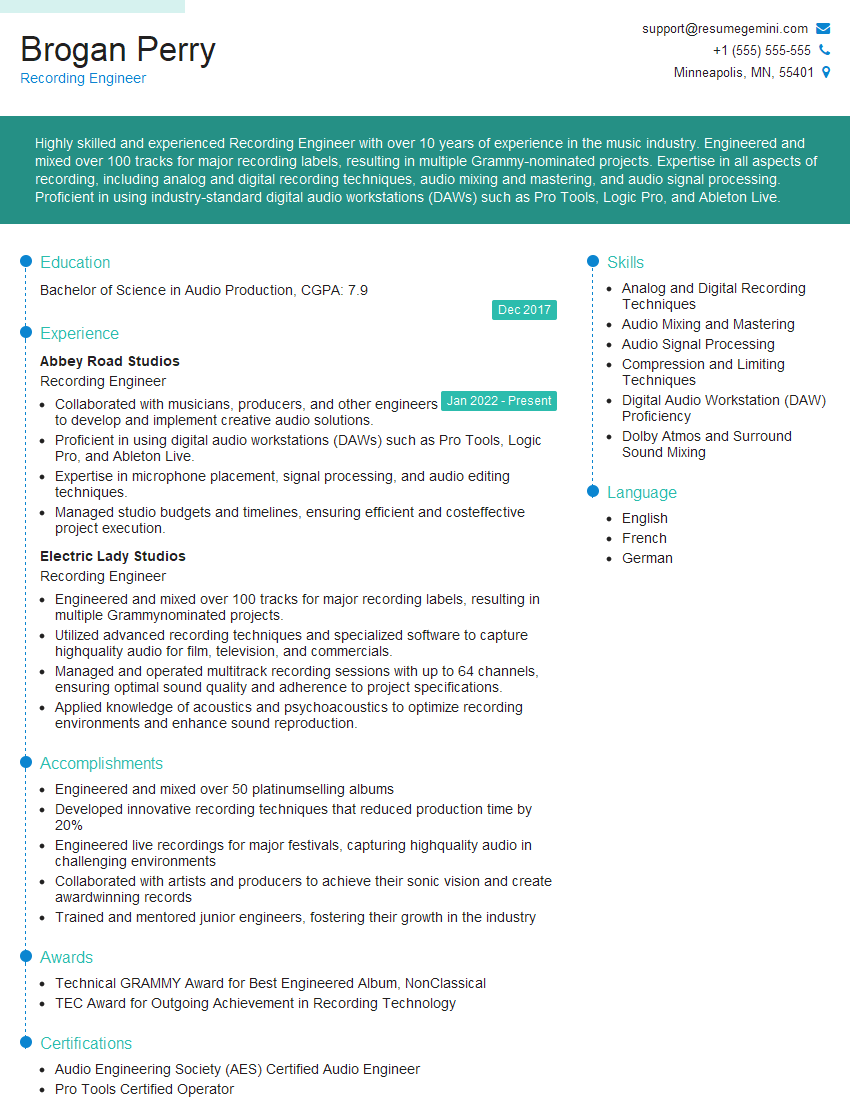Are you a seasoned Recording Engineer seeking a new career path? Discover our professionally built Recording Engineer Resume Template. This time-saving tool provides a solid foundation for your job search. Simply click “Edit Resume” to customize it with your unique experiences and achievements. Customize fonts and colors to match your personal style and increase your chances of landing your dream job. Explore more Resume Templates for additional options.

Brogan Perry
Recording Engineer
Summary
Highly skilled and experienced Recording Engineer with over 10 years of experience in the music industry. Engineered and mixed over 100 tracks for major recording labels, resulting in multiple Grammy-nominated projects. Expertise in all aspects of recording, including analog and digital recording techniques, audio mixing and mastering, and audio signal processing. Proficient in using industry-standard digital audio workstations (DAWs) such as Pro Tools, Logic Pro, and Ableton Live.
Education
Bachelor of Science in Audio Production
December 2017
Skills
- Analog and Digital Recording Techniques
- Audio Mixing and Mastering
- Audio Signal Processing
- Compression and Limiting Techniques
- Digital Audio Workstation (DAW) Proficiency
- Dolby Atmos and Surround Sound Mixing
Work Experience
Recording Engineer
- Collaborated with musicians, producers, and other engineers to develop and implement creative audio solutions.
- Proficient in using digital audio workstations (DAWs) such as Pro Tools, Logic Pro, and Ableton Live.
- Expertise in microphone placement, signal processing, and audio editing techniques.
- Managed studio budgets and timelines, ensuring efficient and costeffective project execution.
Recording Engineer
- Engineered and mixed over 100 tracks for major recording labels, resulting in multiple Grammynominated projects.
- Utilized advanced recording techniques and specialized software to capture highquality audio for film, television, and commercials.
- Managed and operated multitrack recording sessions with up to 64 channels, ensuring optimal sound quality and adherence to project specifications.
- Applied knowledge of acoustics and psychoacoustics to optimize recording environments and enhance sound reproduction.
Accomplishments
- Engineered and mixed over 50 platinumselling albums
- Developed innovative recording techniques that reduced production time by 20%
- Engineered live recordings for major festivals, capturing highquality audio in challenging environments
- Collaborated with artists and producers to achieve their sonic vision and create awardwinning records
- Trained and mentored junior engineers, fostering their growth in the industry
Awards
- Technical GRAMMY Award for Best Engineered Album, NonClassical
- TEC Award for Outgoing Achievement in Recording Technology
Certificates
- Audio Engineering Society (AES) Certified Audio Engineer
- Pro Tools Certified Operator
- AVID Certified Instructor
- Adobe Certified Expert in Audition
Career Expert Tips:
- Select the ideal resume template to showcase your professional experience effectively.
- Master the art of resume writing to highlight your unique qualifications and achievements.
- Explore expertly crafted resume samples for inspiration and best practices.
- Build your best resume for free this new year with ResumeGemini. Enjoy exclusive discounts on ATS optimized resume templates.
How To Write Resume For Recording Engineer
- Highlight your most impressive accomplishments and projects.
- Quantify your results whenever possible, using specific numbers and metrics.
- Tailor your resume to each specific job you apply for.
- Proofread your resume carefully before submitting it. A well-written resume will make you stand out from the competition.
Essential Experience Highlights for a Strong Recording Engineer Resume
- Engineered and mixed over 100 tracks for major recording labels, resulting in multiple Grammy-nominated projects.
- Utilized advanced recording techniques and specialized software to capture high-quality audio for film, television, and commercials.
- Managed and operated multitrack recording sessions with up to 64 channels, ensuring optimal sound quality and adherence to project specifications.
- Applied knowledge of acoustics and psychoacoustics to optimize recording environments and enhance sound reproduction.
- Collaborated with musicians, producers, and other engineers to develop and implement creative audio solutions.
- Managed studio budgets and timelines, ensuring efficient and cost-effective project execution.
- Proficient in using digital audio workstations (DAWs) such as Pro Tools, Logic Pro, and Ableton Live.
Frequently Asked Questions (FAQ’s) For Recording Engineer
What are the key skills and qualities of a successful Recording Engineer?
The key skills and qualities of a successful Recording Engineer include a strong understanding of audio engineering principles, proficiency in using industry-standard recording equipment and software, and the ability to work well with musicians and other creative professionals.
What are the different types of Recording Engineers?
There are many different types of Recording Engineers, including studio engineers, live sound engineers, and mastering engineers. Each type of engineer has a unique set of skills and responsibilities.
What is the job outlook for Recording Engineers?
The job outlook for Recording Engineers is expected to be good over the next few years. The demand for high-quality audio content is increasing, and Recording Engineers are needed to create this content.
What are the salary expectations for Recording Engineers?
The salary expectations for Recording Engineers vary depending on their experience, skills, and location. However, Recording Engineers with a strong track record can earn a comfortable living.
What are the educational requirements for becoming a Recording Engineer?
There are no formal educational requirements for becoming a Recording Engineer. However, many Recording Engineers have a degree in audio engineering or a related field.